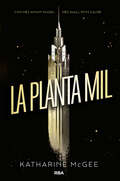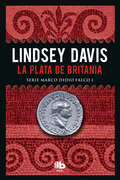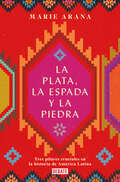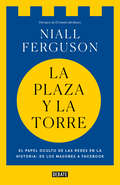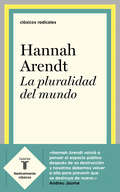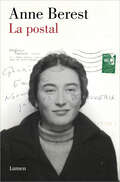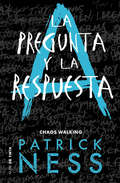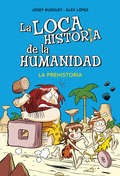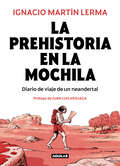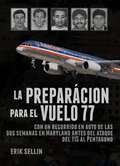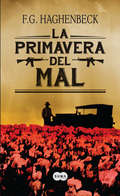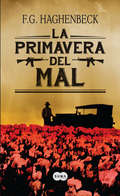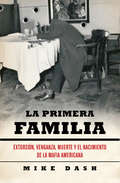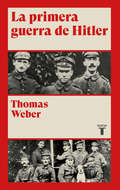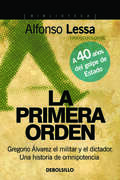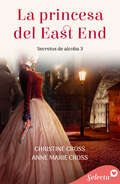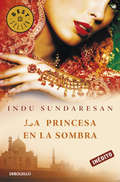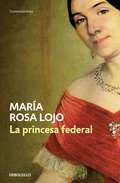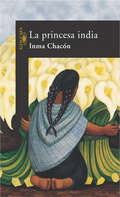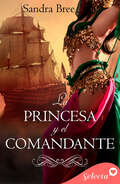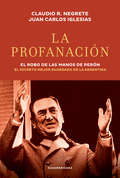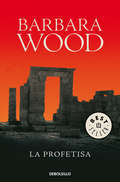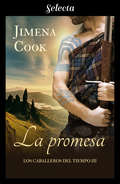- Table View
- List View
La planta mil: Com més amunt puges, més avall pots caure (La planta mil #Volumen 1)
by Katharine McGeeSobreviure a la cúspide té un preu que no tots estan disposats a pagar. Any 2118, una supertorre s’alça sobre l'skyline de Nova York. És una societat en si mateixa, on les plantes superiors estan habitades per famílies immensament riques i a les inferiors subsisteixen les classes més baixes. La caiguda d’una noia des de dalt de tot amenaçarà de fer sortir a la llum els secrets dels seus habitants: mentides, excessos, traïció, amors prohibits... que faran tremolar els fonaments de la torre. Entre el luxe sofisticat i la tecnologia més avançada, un grup de joves haurà de trobar el seu lloc a les altures.
La plata de Britania (Serie Marco Didio Falco #Volumen 1)
by Lindsey DavisLa plata de Britania es el primer título de la fascinante serie ambientada en la Antigua Roma protagonizada por Marco Didio Falco. Un buen día del año 70 d.C., Marco Didio Falco topa casualmente con la joven Sosia Camilina, que huye de un par de matones, pues conoce un peligroso secreto acerca del paradero de unas reservas de lingotes de plata robadas, Falco se embarca en un intrincado caso de contrabando, asesinato y traición que lo lleva a la inhóspita Britania. Allí conoce a Helena Justina, una vivaz aristócrata que se convierte en una parte importante de su vida. Pero, si no va con cuidado, el peligroso rompecabezas de los lingotes de plata podría suponer su muerte...
La plata de Britania (Serie Marco Didio Falco #Volumen 1)
by Lindsey DavisLa plata de Britania es el primer título de la fascinante serie ambientada en la Antigua Roma protagonizada por Marco Didio Falco. Un buen día del año 70 d.C., Marco Didio Falco topa casualmente con la joven Sosia Camilina, que huye de un par de matones, pues conoce un peligroso secreto acerca del paradero de unas reservas de lingotes de plata robadas, Falco se embarca en un intrincado caso de contrabando, asesinato y traición que lo lleva a la inhóspita Britania. Allí conoce a Helena Justina, una vivaz aristócrata que se convierte en una parte importante de su vida. Pero, si no va con cuidado, el peligroso rompecabezas de los lingotes de plata podría suponer su muerte...
La plata, la espada y la piedra: Tres pilares cruciales en la historia de América Latina
by Marie AranaUna lectura necesaria para comprender el tumultuoso pasado de América Latina y la complejidad de su identidad.«Trazar el alma de un continente es una hazaña extraordinaria, y Marie Arana lo hace con precisión académica, rigor moral y elegancia de estilo. Para cualquiera que esté interesado en entender —entenderde verdad— qué es América Latina y de dónde viene, La plata, la espada y la piedra tiene que ser el primer paso».Juan Gabriel Vásquez Marie Arana, en un ejercicio por comprender el origen de las heridas aún abiertas de América Latina, entreteje con maestría las biografías de tres latinoamericanos contemporáneos con mil años de vívida historia. Sus vidas representan las tres fuerzas motrices que han moldeado, desde hace siglos, el carácter de una región: la explotación, la violencia y la religión.Así pues, conocemos a Leonor Gonzáles, una minera que vive en una pequeña comunidad situada a cinco mil metros de altitud en la cordillera andina del Perú y que, como sus antepasados desde tiempos inmemoriales, trabaja escarbando las entrañas de la tierra para extraer pepitas de oro. A su alrededor, el analfabetismo, la desnutrición y las enfermedades reinan como hace quinientos años. Y ahora, al igual queentonces, la supervivencia de su gente depende de un vasto mercado mundial cuyas fluctuaciones se controlan en lugares remotos. A Carlos Buergos, un cubano que luchó en la guerra civil de Angola y que ahora vive en una tranquila comunidad a las afueras de Nueva Orleans. Carlos fue uno de los cientos de delincuentes que Cuba expulsó a Estados Unidos en 1980. Su historia es un eco de la violencia que ha atravesado Latinoamérica desde la época precolombina hasta la actual lucha contra el narcotráfico.Por último, a Xavier Albó, un sacerdote jesuita de Barcelona que emigró a Bolivia. Xavier se considera indio de cabeza y corazón y, por ello, es muy conocido en su país de adopción. Y aunque su objetivo se encuentra en las antípodas del proselitismo, es heredero de un pasado accidentado en el que los sacerdotes marcharon junto a los conquistadores con la misión de evangelizar el Nuevo Mundo. Desde entonces, la Iglesia católica ha desempeñado un papel central en la vida política de América Latina.El resultado, en una perfecta combinación entre el ensayo histórico, el reportaje y el análisis político, es el retrato vibrante de un continente cuya identidad ha sido siempre compleja. La crítica ha dicho:«La plata, la espada y la piedra, como bien señala Arana, no es una historia completa ni definitiva de América Latina. Tampoco es una crónica periodística. Es más bien un híbrido, que combina la erudición del análisis histórico con la profundidad del buen reportaje y una aguda comprensión del contexto político [...] una voz informada y autorizada que merece ser ampliamente escucha».Álvaro Enrigue «[Una] historia impresionantemente concisa y a la vez exhaustiva. Una obra profundamente conmovedora y relevante que proporciona nuevas líneas de reflexión».Kirkus Reviews «Una historia de América Latina de gran alcance [...]. Tan cautivadora como exhaustiva [...] Una maravilla».Publishers Weekly
La plaza y la torre: Redes y poder: de los masones a Facebook
by Niall FergusonUna historia de las redes organizacionales que han cambiado el mundo y una invitación a la reflexión escéptica sobre el papel que tienen en nuestra sociedad. La mayor parte de la historia es jerárquica: tiene que ver con papas, presidentes o primeros ministros. Pero, ¿y si fuera así por el simple hecho de que han sido ellos los que han creado los archivos históricos? ¿Y si estuviéramos omitiendo y relegando la influencia de poderosas pero menos visibles redes de organización? El siglo XXI ha sido proclamado como la Era de la Red, pero en este libro Niall Ferguson nos recuerda que las redes sociales no tienen nada de novedoso. Desde el tiempo de las imprentas y los predicadores que llevaron a cabo la Reforma hasta los masones que lideraron la Revolución estadunidense, fueron las redes organizacionales quienes interrumpieron el orden establecido. Así pues, lejos de ser una novedad, nuestra era es más bien la Segunda Era de la Red, con el ordenador ocupando el papel central que en su momento ocupó el papel impreso. Quienes esperan una utopía de «internautas» interconectados pueden, por lo tanto, sentirse decepcionados. Las redes son propensas a la agrupación, los contagios, pero ante todo a las interrupciones y los conflictos del pasado encuentran paralelismos desconcertantes hoy, en el tiempo de Facebook, el Estado Islámico y el mundo trumpiano. Este maravilloso libro revela la historia oculta de las redes organizacionales que han cambiado el rumbo de la historia y se presenta a la vez como un antídoto hacia las teorías de la conspiración y un desafío a la historiografía tradicional que nunca han prestado demasiada atención a las redes informales de influencia. Reseñas:«Cautivante y convincente.»The New York Times «Niall Ferguson ha escrito nuevamente un brillante libro... En 400 páginas habrás reabastecido tu mente. Hazlo.»The Wall Street Journal «Ferguson nos recuerda que la red social no surgió completa de la mente de Mark Zuckerberg; más bien, es una fuerza persistente en los asuntos humanos que ofrece una lente novedosa sobre el pasado y el desconcertante presente.»San Francisco Chronicle
La pluralidad del mundo
by Hannah ArendtLa obra de Hannah Arendt sintetizada en esta antología esencial e imprescindible. No hay nada más radical que un clásico. Hannah Arendt, la gran pensadora del siglo XX, es sin duda fundamental para afrontar los desafíos del XXI. Abordó todas las cuestiones clave de su tiempo, desde el antisemitismo hasta el totalitarismo, los orígenes de la democracia, la crisis de la autoridad, los fundamentos de la educación y la estética o el problema del mal en la modernidad. Toda su obra está sintetizada en esta antología esencial e imprescindible. ------------- radical: adj. Perteneciente o relativo a la raíz. «Clásicos Radicales» nace con la misión de recuperar algunos de los libros más emblemáticos del sello que en su día formularon una idea nueva u ofrecieron una mirada original y pertinente sobre las grandes cuestiones universales.Ausentes de las librerías durante demasiado tiempo pero recordados y buscados por los lectores más despiertos, estos textos esenciales de disciplinas como la filosofía, la ética, la historia, la sociología, la economía, la antropología, la psicología y la política mantienen su plena vigencia y vuelven hoy con fuerza para iluminar nuestro presente. ------------- Reseña:«Hannah Arendt volvió a pensar el espacio público después de su destrucción y nosotros debemos volver a ella para prevenir que se destruya de nuevo.»Andreu Jaume
La postal
by Anne BerestPREMIO RENAUDOT DES LYCÉENS, PREMIO SELECCIÓN GONCOURT DE ESTADOS UNIDOS Y GRAN PREMIO DE NOVELA DE LAS LECTORAS DE ELLE, CON MÁS DE 150.000 EJEMPLARES VENDIDOS EN FRANCIA Una novela aclamada por la crítica y los lectores en torno a una investigación familiar apasionante: una historia real marcada por la Shoah que se lee como un thriller. UNO DE LOS LIBROS MÁS ESPERADOS DE SEPTIEMBRE SEGÚN ELLE «Una obra maestra. Un libro inolvidable que te atrapa desde la primera página».David Foenkinos Fue en enero de 2003. En el buzón de la casa familiar apareció una extraña postal sin firma: en el anverso, la Ópera Garnier, y en el reverso, cuatro nombres, los de los bisabuelos maternos de Anne Berest —Ephraïm y Emma—, y los hijos de estos —Noémie y Jacques—, todos ellos fallecidos en Auschwitz en 1942. ¿Quién envió la tarjeta y con qué siniestra intención? Veinte años después, la autora decide averiguarlo y remontarse un siglo atrás para reconstruir el periplo vital de los Rabinovitch: su huida de Rusia, su viaje a Letonia, Palestina y París, y luego la guerra. Una investigación exhaustiva y apasionante, para la cual cuenta con la ayuda de su madre, un detective privado y un grafólogo, y que la llevará a interrogar a los habitantes del pueblo donde sus parientes fueron detenidos, a buscar indicios en los libros y a ahondar en la vida de la única superviviente de la saga: su abuela Myriam. La crítica ha dicho:«Una búsqueda que combina los resortes del thriller con tintes de un réquiem tan conmovedor como asombroso».Marc Lambron, Le Point «Berest entreteje el pasado con el presente en un libro de historia, rico en indagaciones, que se lee como una gran novela».Astrid de Larminat, Le Figaro Littéraire «Una historia íntima y profunda que ha sido la estrella de la rentrée. [...] Una novela muy auténtica, imprescindible. [...] El lector alterna la risa con el llanto».Clémentine Goldszal, Elle «Una construcción narrativa perfecta escrita con un estilo sobrio cuyo resultado es un libro conmovedor y universal. Una lectura necesaria».Marie-Eve Charbonnier, Page «Un libro personal y universal, actual y eterno. [...] Magnífico».M. T. H., Madame Figaro «Con una escritura vivaz, Berest convierte una historia llena de suspense en un libro adictivo».Florence Pitard, Ouest France «Una novela maravillosamente construida, con un aliento poderoso. [...] Una lectura impactante, adictiva y abrumadora».Mathilde Mahieux, La Croix «Emotiva y trascendental».L'OBS «Fascinante de principio a fin».L. C., Le Figaro Magazine «Contada como un cuento de Las mil y una noches y repleta de personajes entrañables, esta increíble odisea nos mantiene en vilo hasta las últimas líneas».Monique Ayoun, BIBA «Una novela cautivadora».Valentine L. Delétoille, Paris Match
La pregunta y la respuesta (Chaos Walking #Volumen 2)
by Patrick NessLa continuación de la aclamada trilogía en que se basa la superproducción Chaos Walking, del novelista de Un monstruo viene a verme. En Prentisstown tus pensamientos son públicos. No existen los secretos. En su huida de un ejército implacable, Todd y Viola se encuentran una vez más con su peor enemigo, el alcalde Prentiss, que los espera para darles la bienvenida a Nueva Prentiss. Todd es encarcelado y separado inmediatamente de Viola. Ahora tiene que aprender a vivir bajo las reglas del nuevo régimen. ¿Pero qué secretos se esconden fuera de la ciudad? ¿Dónde está Viola? ¿Quién es la misteriosa Respuesta? Y un día, las bombas comienzan a estallar. De El cuchillo en la mano se ha dicho...«Recomendaría insistentemente la trilogía de Patrick Ness a cualquiera. Es extraordinaria».The Guardian «El cuchillo en la mano nos introduce en un mundo que no nos deja indiferentes y del que deseamos saber mucho más. Un comienzo frenético de trilogía, de una trilogía que continúa con La pregunta y la respuesta, que llegará en otoño, libro que estoy muriéndome por leer.»Vorágine interna «Espero grandes cosas de esta trilogía.»Juanma Sarmiento, The Best Read Yet «El cuchillo en la mano sido una novela espectacular que no ha tardado en convertirse en una de mis favoritas. Deseando leer su continuación que, probablemente, tampoco me decepcionará.»El rastreador de letras
La prehistoria (La loca historia de la humanidad #Volumen 1)
by Josep Busquet Àlex López¿Cansado de clases interminables y libros de texto aburridos? ¡Prepárate para la diversión! Llega La loca historia de la humanidad, un divertido repaso por la historia del ser humano con una mezcla de humor, pasatiempos, curiosidades y explicaciones sencillas y amenas para pasarlo en grande.Y en este recorrido por la historia te acompañarán los Tempo, ¡la familia más alocada y aventurera de todos los tiempos! No te pierdas sus peripecias por la Prehistoria y descubre todo lo que hay que saber sobre los orígenes de la humanidad.
La prehistoria en la mochila: Diario de viaje de un neandertal
by Ignacio Martín LermaLa historia de Sepik es la historia de la humanidad.Un épico viaje por yacimientos peninsulares de época neandertal que hará volar tu imaginación. Sepik, un joven neandertal, sale de su cueva en busca de un nuevo lugar rico en recursos que garantice la continuidad de su grupo. Su aventura, escrita en primera persona en forma de cuaderno de viaje y enriquecida con ilustraciones y comentarios explicativos del autor, nos ofrecerá todo tipo de datos y curiosidades sobre cómo vivieron nuestros antepasados durante el Paleolítico a través de un recorrido por algunas de las cuevas más relevantes que han sido descubiertas hasta ahora. Ignacio Martín Lerma, arqueólogo y especialista en el Paleolítico, nos propone retroceder miles de años en el tiempo hasta llegar a una de las épocas más antiguas de la humanidad. Apasionado de la divulgación y firme defensor de la ciencia «accesible», el autor plantea un viaje por catorce de los yacimientos neandertales más destacados de la península Ibérica. Cuestiones como la muerte, la caza, la alimentación o el arte, cobran protagonismo en un precioso relato que, de manera sencilla y brillante y combinando la ficción con la realidad, nos transporta hasta uno de los periodos más desconocidos de nuestro pasado. «Les doy la bienvenida a un apasionante paseo por una de las épocas que más incógnitas mantiene de nuestro pasado. En este texto, que pone la ficción al servicio de la divulgación, se mezclan datos de total rigor científico con otros creados para darle al relato la cohesión y la doble función de divulgar, pero también de hacer pasar un buen rato a quien lo lea».Ignacio Martín Lerma Críticas:«Viajemos con la imaginación a esos lugares míticos del universo neandertal que los científicos están sacando a la luz. Entre ellos figura destacadamente Ignacio Martín Lerma».Juan Luis Arsuaga
La preparación para el vuelo 77: con un recorrido en auto de las dos semanas en Maryland antes del ataque del 11S al Pentágono
by Erik SellinEl atentado de septiembre de 2001 contra el Pentágono formó parte de los ataques terroristas más osados y exitosos jamás organizados. Este libro analiza específicamente el atentado que devastó la sede del Departamento de Defensa, examina a Osama bin Laden, el origen de Al Qaeda y cómo se seleccionó a los secuestradores para el ataque. También describe cómo llegaron estos hombres a Estados Unidos y dónde se reunieron. La segunda parte del libro lleva al lector por un escalofriante recorrido en auto por los lugares de Maryland que los cinco secuestradores frecuentaron en las dos semanas previas al 11 de septiembre. Por último, se ofrece información sobre el atentado y sus consecuencias. Se trata de una visión intrigante de cómo cinco hombres, dispuestos a la destrucción y el terror, vivían y se movían entre la población general, con una facilidad inquietante, en las semanas previas al atentado.
La primavera del mal
by F. G. HaghenbeckA principios del siglo XX, los chinos controlaban el negocio de las drogas en la frontera de México con Estados Unidos. Pero el poder les fue arrancado brutalmente con las armas de la revolución y con la complicidad de policías corruptos. Se inicia la guerra del opio y de la marihuana, el negocio más lucrativo en el mundo. En esos convulsos años, un coronel revolucionario, Benito Guadalupe Serrano, comienza a dominar el intercambio ofreciendo protección a los narcotraficantes y uniéndose a personajes oscuros como el gobernador Maximino Ávila Camacho o el gánster Lucky Luciano. Pero Guadalupe solo confía en dos personas: su hijo Bernardo y su ahijado, el inteligente y joven Raúl Duval, que aspira a crecer en el negocio. Raúl se verá involucrado en un triángulo amoroso con su peor enemigo, Jimmy O. Ball, un agente de Narcóticos norteamericano, y la seductora cantante y actriz Carmela del Toro. El romance creará un enfrentamiento entre ellos más intenso que el que yaexiste. Entre traiciones y muertes, las piezas de este ajedrez del crimen se van moviendo a lo largo de veinte años, desde los primeros estallidos de violencia hasta su solapamiento por parte de las autoridades.
La primavera del mal
by F.G. HaghenbeckUn coronel revolucionario ofrece protección a narcotraficantes mientras comienza un triángulo amoroso con una cantante y actriz y su peor enemigo. Del autor de El código nazi, Francisco G. Haghenbeck, ganador del premio Otra vuelta de tuerca para novela policiaca y del Premio Bram Stoker. Entre traiciones y muertes, las piezas de este ajedrez del crimen se van moviendo a lo largo de veinte años, desde los primeros estallidos de violencia hasta su solapamiento por parte de las autoridades. A principios del siglo XX, los chinos controlaban el negocio de las drogas en la frontera de México con Estados Unidos. Pero el poder les fue arrancado brutalmente con las armas de la revolución y con la complicidad de policías corruptos. Se inicia la guerra del opio y de la marihuana, el negocio más lucrativo en el mundo. En esos convulsos años, un coronel revolucionario, Benito Guadalupe Serrano, comienza a dominar el intercambio ofreciendo protección a los narcotraficantes y uniéndose a personajes oscuros como el gobernador Maximino Ávila Camacho o el gánster Lucky Luciano. Pero Guadalupe solo confía en dos personas: su hijo Bernardo y su ahijado, el inteligente y joven Raúl Duval, que aspira a crecer en el negocio. Raúl se verá involucrado en un triángulo amoroso con su peor enemigo, Jimmy O. Ball, un agente de Narcóticos norteamericano, y la seductora cantante y actriz Carmela del Toro. El romance creará un enfrentamiento entre ellos más intenso que el que ya existe. Lo que ha dicho la crítica: "Podemos rastrear en La primavera del mal los orígenes del fenómeno de las drogas entre México y Estados Unidos de los años 30 al 50. Los intereses y acuerdos secretos entre las autoridades de ambos países, las guerras por los territorios, las complicidades y traiciones cuyas consecuencias trazan un reguero de sangre hasta nuestros días". -Clarín. "En esta novela se detalla cómo se inicia uno de los negocios más lucrativos y ahora sanguinarios de la historia de nuestro país: el narcotráfico. (...) Se puede decir que se trata de una novela negra, en donde se descubren las claves del problema". -Animal político. "En La primavera del mal queda claro que la política de Washington estuvo marcada por la doble moral (...) mientras que en México se impuso la corrupción". -Periódico Victoria. "Haghenbeck sabe mezclar a los personajes reales (...) con los de su invención". -Proceso.
La primera familia: Extorsión, venganza, muerte y el nacimiento de la mafia americana
by Mike DashUna exhaustiva investigación nunca antes realizada sobre los orígenes de la mafia estadounidense, tantas veces retratada en el cine y la televisión. Esta es la historia de los criminales más violentos y eficaces de la historia de Estados Unidos, y de cómo consiguieron salir de las aguas sicilianas para establecerse con éxito en Norteamérica. Y al mismo tiempo, es la historia de una familia: la primera familia del crimen organizado en Nueva York, un extenso y unido clan de extorsionadores y asesinos que abandonaron su hogar en el legendario corazón de la mafia, Corleone, para convertirse en los padrinos fundadores del nuevo mundo. Mucho antes que los Soprano, que el Padrino o que las cinco familias que han dominado el crimen organizado en Estados Unidos durante medio siglo, mucho antes que todos ellos, llegaron Giuseppe Morello y sus sangrientos hermanos. Por primera vez, un libro se nutre de archivos estadounidenses e italianos casi desconocidos, de documentos desclasificados de los servicios secretos, de los archivos policiales y judiciales neoyorquinos, así como de entrevistas con los últimos supervivientes de la familia Morello-Terranova, para contarnos el nacimiento de Little Italy y sus clanes mafiosos. La crítica ha dicho...«Un libro excelente de un historiador británico cuya capacidad para la investigación carece de límites. Dash se ha sumergido en toneladas de material para emerger con una obra de historia divulgativa en lo que probablemente sea el trabajo definitivo sobre la cuestión en los años venideros.»The Washington Post «Arrebatador, convincente, absorbente.»The New York Times «Cercana, personal, y repleta de detalles..., Dash constituye una rareza: es un metódico investigador y un escritor capaz de esculpir esta historia con una pluma tan perfecta y afilada como un estilete. Su estilo narrativo es novelístico, una apariencia desmentida por las extensas y precisas notas explicativas, que lo equiparan con algunos de los más reputados escritores sobre la mafia.»Toronto Globe & Mail
La primera guerra de Hitler
by Thomas WeberLa revelación de la vida privada y pública de Hitler y de la I Guerra Mundial basada en una investigación sin precedentes. Hitler mantenía que sus años como soldado en la I Guerra Mundial fueron los más influyentes de su vida. Sin embargo, y pese a las más de seis décadas transcurridas desde su muerte, su etapa en el Frente Occidental seguía hasta ahora rodeada de misterio y presunciones infundadas. La primera guerra de Hitler desvela por primera vez la verdadera experiencia del futuro líder nazi durante el conflicto. Haciendo uso de documentación inédita y de testimonios de sus compañeros de regimiento, Thomas Weber presenta una esclarecedora visión de la vida privada y pública de Hitler, muy alejada del mito que él mismo creó tras su llegada al poder. Este libro revela a un Hitler encargado de tareas de retaguardia, rechazado por los soldados del frente y en el que sus superiores detectaron ausencia de «cualidades delíder»; un personaje que permaneció inseguro de sus ideas hasta el final de la guerra y que ocultó, exageró y deformó sus vivencias a lo largo de su estudiada carrera. ¿Fue Hitler meramente un producto de su tiempo o una anormalidad que se escapa a toda previsión? La polémica y original obra de Weber arroja además luz sobre este interrogante que sigue desafiando a los historiadores y cuestiona la creencia unánimemente aceptada de que la I Guerra Mundial fue la experiencia crucial de su formación política e ideológica y el origen del camino que condujo de forma natural al nazismo. Reseña:«Weber altera sustancialmente nuestra visión de uno de los personajes más estudiados del siglo XX.»Norman Stone, Wall Street Journal «El título de este libro es preciso y completo, pero no da cuenta del alcance y la importancia de su contenido. Magnífico e impresionante.»Times Literary Supplement «Revelador y apasionante. Mediante unconcienzudo estudio, desmonta lugares comunes, tópicos y clichés.»Jacinto Antón, El País «Una exploración bien documentada que plantea interesantes preguntas sobre las creencias y actitud de Hitler durante la Primera Guerra Mundial.»Ian Kershaw «Fascinante de principio a fin. Una obra de referencia, tan reveladora como atrapante.»The Canada Post «¿Fue Hitler un soldado valiente durante la Primera Guerra Mundial? Thomas Weber desmonta todos los tópicos en torno al führer.»Eduardo González Calleja, ABC «Un estudio innovador y valioso basado en una hábil investigación. Revelador y accesible.»The Spectator «El joven historiador escudriña los cuatro años de Hitler como soldado durante la Primera Guerra Mundial para arrojar alguna luz nueva sobre el perfil de este personaje inevitable en las pesadillas de los europeos.»Víctor Amela, La Vanguardia
La primera orden: Gregorio Álvarez el militar y el dictador. Una historia de omnipotencia
by Alfonso Lessa"Una investigación que retrata la personalidad del general (r) GregorioÁlvarez y reconstruye los pasos que, con una vocación políticainfrecuente entre los militares, lo convirtieron en el general máspoderoso de la historia uruguaya reciente." Una investigación integral y rigurosa, con la perspectiva que merece uncapítulo crucial de la vida política del país. Lessa se nutrió deentrevistas a referentes políticos y militares de la época, hombrescercanos a Álvarez y otros que lo enfrentaron, y reunió valiososdocumentos muchos inéditos o casi desconocidos que se rescatan en estapublicación. El apetito de poder del general Gregorio Álvarez, su sordadisputa con Bordaberry, la lucha por la conducción económica en ladictadura, los golpes dentro del golpe, las conversaciones con elenemigo, su plan político, los intentos de asesinarlo, su obsesión porlos dirigentes políticos y en particular por Wilson, el papel de sugobierno y de Uruguay en la guerra de las Malvinas, las autocríticasdespués del No del 80, el peso psicológico de los caceroleos, el pactodel Club Naval a sus espaldas, las negociaciones secretas y la visita delos reyes de España son algunos de los puntos más relevantes de estainvestigación imprescindible.
La princesa del East End (Secretos de alcoba #Volumen 3)
by Christine Cross Anne Marie CrossÚltima entrega de la irresistible trilogía Secretos de alcoba. Ella lo cautivó desde su primer encuentro, y él se prometió que, algún día, esa mujer sería suya. Ella era rebelde. Él había prometido conquistarla. Un matrimonio por conveniencia ligará sus destinos y hará surgir la pasión y el amor, a pesar de los peligros. En el peligroso mundo de los bajos fondos londinenses, Camilla Lambert se ha ganado un hueco en el corazón de las prostitutas y de los niños de la calle. En su deseo por ayudarlos, no encuentra otro camino que el de un matrimonio por conveniencia. Charles siempre ha estado enamorado de Camilla. Ahora que se ha convertido en su esposa, solo tiene que conquistarla. Pero ¿cómo conquistar a alguien que no cree en el amor? Juntos iniciarán un camino difícil, en el que la pasión y la ternura lograrán abrirse paso en sus corazones. Sin embargo, los planes de ambos y su propio matrimonio se verán amenazados por un peligro oscuro y misterioso que acecha en los bajos fondos.
La princesa en la sombra (Trilogía Taj Mahal #Volumen 3)
by Indu SundaresanUn amor imposible y una lucha fratricida por el poder en la corte imperial india del siglo XVII. 17 de junio de 1631. La bella Aryumand ha muerto al dar a luz. A su lado la lloran su marido, el emperador mogol Sha Yahan, y la hija mayor de ambos, la princesa Yahanara. Con solo diecisiete años, Yahanara debe asumir las responsabilidades de una emperatriz sin serlo: acompañar a su padre en el duelo, tomar las riendas del harén, administrar las enormes riquezas de su madre y atemperar los ánimos de sus hermanos, que prepararán la sucesión cada uno por su cuenta. Una sola cosa alegra los días a Yahanara: las atenciones que le depara el apuesto Nayabat Jan. Sin embargo hay quien, aconsejado por las malas lenguas, no ve con buenos ojos su relación con este noble venido del norte, porque ella debe gobernar en la sombra mientras Sha Yahan dedica su tiempo y los recursos de su imperio a construir el mayor homenaje al amor de la historia de la humanidad, el Taj Mahal. La crítica ha dicho...«Rivalidades entre hermanos, luchas por el poder, engaños, amores no correspondidos y alianzas secretas: un verdadero festín.»Elle
La princesa federal
by María Rosa LojoLa novela emblemática sobre Manuelita Rosas, instalada entre loslectores como una obra clave para la comprensión de un mito delimaginario nacional más allá de los clichés y las fáciles antinomias. En 1893 Gabriel Victorica, joven médico de familia federal, llega aEuropa con un cuaderno punzó para entrevistar en su exilio londinense auna legendaria y ya anciana Manuela Rosas, que irá evocando para élsombras y esplendores.El otro lado de su historia se oculta bajo las tapas rojas de esecuaderno donde Pedro de Angelis, erudito napolitano al servicio deRosas, ha escrito sus más secretos pensamientos sobre el Gobernador y la«Niña». ¿Ha sido Manuela víctima o cómplice de su padre, hada compasivao hábil política? El lector tiene la última palabra.«Una escritura bella y compleja, una coartada estética para penetrar unenigma y encontrar solo preguntas». Elsa Drucaroff, revista El PlanetaUrbano
La princesa india
by Inma ChacónUna historia de amor entre el choque de culturas. «A veces los dioses se interponen entre los hombres que están por venir y las mujeres que los han de traer.» En la aventura del nuevo mundo una joven azteca con misteriosos poderes y un capitán del ejército de Hernán Cortés verán unida su suerte por el azar y el destino. Los dos se embarcarán hacia España, y juntos iniciarán una lucha, repleta de riesgos y peripecias, por conquistar el amor y la verdad. Auténticos náufragos de ese destino, entrelazan sus vidas de una orilla a otra de la historia, entre la guerra y la distancia, entre la América del Imperio azteca y la España de la Inquisición. La princesa india combina el relato de aventuras con la crónica de Indias, y en un acercamiento lírico y sentido a las culturas indígenas, Inma Chacón nos regala un mosaico de géneros literarios que es a su vez un homenaje a nuestra literatura clásica.
La princesa y el comandante
by Sandra Bree¿Podrá el cariño de Jade curar la sed de venganza de Diego? Jade, nacida del sultán y de una esclava inglesa, vive en el palacio de su padre alejada de los privilegios de su nacimiento, ejerciendo de acompañante de la hija favorita del emperador, Corinna, quien siempre la trató como a una hermana. Al llegar a las prisiones del alcázar una joven española que ha sido comprada, se compadece de ella y la cuida, ganándose el odio de su tía, la hermana del emperador turco. Cuando en una escapada secreta de su hermana para ver a su amado, son secuestradas, Jade se hace pasar por la princesa y es llevada al galeón de un español que ha llegado a Turquía con sed de venganza y no dudará en utilizar a Jade para conseguirla. Para Diego Salazar ha llegado la hora de casarse con su prometida y embarcarse en la Gran Armada, pero el secuestro de su joven hermana por los otomanos acelera su salida de España como capitán del Destructor Azul bajo bandera pirata para arribar cuanto antes a costas turcas. Allí, secuestra a la hija del sultán para proponer un intercambio. Pero, durante los días que la tiene en su nave, descubre a una mujer muy diferente a la que esperaba; hermosa y amable, hace que su odio se tambalee y que dese que las cosas fueran de otro modo, en especial cuando la pasión se desborda entre ellos. ¿Qué es más fuerte, el odio a los enemigos o el amor verdadero?
La profanación: El robo de las manos de Perón. El secreto mejor guardado de la Argentina
by Juan Carlos IglesiasLa investigación más exhaustiva sobre el hecho que en 1987 conmovió al país y al mundo: la profanación de la tumba de Juan D. Perón, y el corte y la desaparición de las manos de su cadáver. El 1 de julio de 1987 la Argentina fue sacudida por la noticia de la mutilación del cadáver de Perón en el Cementerio de la Chacarita: sus manos habían sido robadas. Al estupor le siguieron las hipótesis: se las habían llevado para cobrar un rescate millonario o para acceder con sus huellas digitales a cuentas en Suiza; el ultraje había sido parte de un rito masónico en venganza por pactos no cumplidos por el ex presidente, o un mensaje de la poderosa logia Propaganda Due de Licio Gelli o una ceremonia esotérica de otro origen. El gobierno de Alfonsín sostuvo que se trataba de un ajuste de cuentas entre líneas internas del peronismo, y éste contraatacó diciendo que era una campaña del radicalismo para perjudicarlo en las elecciones de gobernadores de ese año. Pero el hecho no quedó ahí: el juez del caso, Jaime Far Suau, fue asesinado, y dos testigos clave fallecieron en circunstancias sospechosas; además, el comisario a cargo de la investigación sobrevivió milagrosamente a un disparo a quemarropa y al poco tiempo fue pasado a retiro sin justificación. Claudio R. Negrete -periodista- y Juan Carlos Iglesias -abogado que integró el equipo de Far Suau- investigaron durante años para escribir este libro, que sigue a fondo cada una de las pistas y reconstruye la historia completa de un hecho impune que la ficción más descabellada no se hubiera atrevido a imaginar, y cuya conclusión, a tres décadas de sucedido, es "nadie sabe; nadie fue".
La profetisa (Bestseller/debolsillo Ser. #Vol. 458)
by Barbara WoodCatherine ha hecho un descubrimiento arqueológico que podría hacer tambalear los cimientos de la cultura occidental. En una carrera contra el Apocalipsis, la joven deberá enfrentarse al FBI, al Vaticano y a un siniestro millonario para averiguar toda la verdad. Diciembre de 1999, Desierto del Sinaí: la arqueóloga Catherine Alexander encuentra seis papiros escritos en el siglo I d.C., en los que se menciona el nombre de Jesús y que contienen unas revelaciones inquietantes, de un valor histórico incalculable. Pronto se propaga la noticia del hallazgo, y desde ese mismo momento a Catherine no le quedará otro remedio que huir. Con la ayuda de otro arqueólogo y de un sacerdote con el que establece una ambigua relación, emprenderá una carrera contrarreloj para tratar de preservar los manuscritos de la codicia de gobiernos, coleccionistas sin escrúpulos y la propia iglesia, que ve tambalear sus propios fundamentos. Reseñas:«Wood es un portento cuando se trata de conjugar acción y romance, porque consigue que ambos destaquen y que mantengan su fuerza por igual.»Kirkus Reviews «Bárbara Wood es una artista.»Washington Post Book World «[Barbara Wood es] una autora consumada.»New York Times Bestselling Author
La promesa (Los caballeros del tiempo #Volumen 3)
by Jimena CookLlega la última entrega de la trilogía «Los caballeros del tiempo», iniciada en La elegida, con la historia de Aldan y Mónica. Un amor capaz de traspasar la línea del tiempo y una promesa que nunca será olvidada. «Ahora puedo sentirte... ¡Vuelve a mí!» Mónica supo desde el primer momento que no había sido un sueño. Él había irrumpido en su vida de repente, sin previo aviso, para protegerla y ayudarla a cumplir una misión. Una pitonisa, una promesa hecha hace muchos siglos y una carta de un caballero de otra época irrumpirán en su vida hasta llegar a obsesionarla y forzarla a buscar respuestas a todas las incógnitas. Aldan Macrae se resiste a realizar el deber encomendado por su padre: acompañar a un muchacho inglés hasta la abadía de Kinloss. Ese joven representa la esperanza para las Tierras Altas, pero el guerrero no considera que sea un cometido para el jefe del clan Macrae. Su actitud cambia cuando descubre que bajo esa apariencia de niño se esconde una bella dama, Katherine Dunnottar, una joven misteriosa que guarda un gran secreto. ¿Mónica o Katherine? ¿Pasado o Presente? Ella tendrá que elegir, pero antes deberá vencer sus miedos y peligros que desde el siglo XI la persiguen. Los lectores de la trilogía han dicho...«Me leí el primer libro de la triología y me encanto todo lo sucedido entre Elizabert y Kimbal y el segundo libro con Ana y Korva me ha gustado con mucho amor, aventuras, intrigas etc. Espero que llegue pronto la tercera entrega.» «Ya me encantó el primero de esta serie y estaba deseando poder leer este. Y no me ha decepcionado. Me ha gustado muchísimo la historia y estuve atrapada desde el primer momento. Lo leí rapido porque no podía parar. Como en todos sus libros, Jimena Cook me ha hecho viajar.» «De verdad, hacía mucho que no leía dos novelas realmente lindas y con una gran historia, gracias por estos dos libros de "Los Caballeros del Tiempo".»
La promesa de lady Wright (El destino de los Wright #Volumen 6)
by Arlene SabarisPor las grietas de una promesa rota se colará el amor entre dos corazones más parecidos de lo que están dispuestos a admitir. Lady Elisabeth Wright es la más pequeña y consentida de Marton Hall. La vivaz jovencita no está acostumbrada a recibir un "no" como respuesta y al llegar su temporada no puede pensar en otra cosa que en lucir los muchos vestidos nuevos que han sido preparados para ella, y en que por fin conocerá a aquel que la desposará en la más lujosa de las bodas.Sin embargo, eventos inesperados la llevarán a pasar unos meses con sus familiares en España y a pesar de que al principio le resulta una injusticia marcharse justo cuando la solicitan los más agradables pretendientes, pronto descubrirá que aquel viaje es todo lo que necesita. El reencuentro con un viejo rival de su infancia le hará cuestionarse la promesa que se había hecho a sí misma de casarse en la más ostentosa de las ceremonias con el más apuesto y rico noble de Londres, quienquiera que sea. Pronto Elisabeth se debatirá entre aquello que considera perfecto y un nuevo sentimiento que nace en su corazón o que quizás ha estado allí desde siempre. El destino de los Wright nos traslada en primer lugar a la Inglaterra de la época de Regencia. Nos lleva de los grandes bailes de Londres a la campiña inglesa. También a las Tierras Altas de Escocia, sin que falte un paseo por España. Todo siguiendo las vidas de la familia Wright cuyo legado perdurará en el tiempo.
